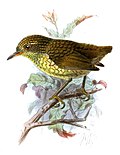Myrmoborus
| Myrmoborus | |
|---|---|
 | |
| Black-faced antbird (Myrmoborus myotherinus) | |
| Scientific classification | |
| Domain: | Eukaryota |
| Kingdom: | Animalia |
| Phylum: | Chordata |
| Class: | Aves |
| Order: | Passeriformes |
| Family: | Thamnophilidae |
| Genus: | Myrmoborus Cabanis & Heine, 1860 |
| Type species | |
| Pithys leucophrys Tschudi, 1844 | |
Myrmoborus is a genus of passerine birds in the antbird family, Thamnophilidae.
The genus was erected by the German ornithologists Jean Cabanis and Ferdinand Heine in 1860 with the white-browed antbird as the type species.[1][2] The genus name is a combination of two Greek words: murmos, meaning "ant" and -boros (from "bibros"), meaning "-devouring".[3]
The genus contains five species:[4]
| Image | Common Name | Scientific Name | Distribution |
|---|---|---|---|
 | White-browed antbird | Myrmoborus leucophrys | Amazonia |
 | Ash-breasted antbird | Myrmoborus lugubris | banks of the Amazon river |
 | Black-tailed antbird | Myrmoborus melanurus | banks of upper Amazon river |
 | Black-faced antbird | Myrmoborus myotherinus | Amazonia |
 | White-lined antbird | Myrmoborus lophotes | southwestern Amazonia |
The white-lined antbird was previously placed in the genus Percnostola but a genetic study published in 2013 found that it is embedded within Myrmoborus.[5]
References
[edit]- ^ Cabanis, Jean; Heine, Ferdinand (1860). Museum Heineanum : Verzeichniss der ornithologischen Sammlung des Oberamtmann Ferdinand Heine, auf Gut St. Burchard vor Halberstadt (in German and Latin). Vol. 2. Halberstadt: R. Frantz. p. 9.
- ^ Peters, James Lee, ed. (1951). Check-list of Birds of the World. Vol. 7. Cambridge, Massachusetts: Museum of Comparative Zoology. p. 220.
- ^ Jobling, James A. (2010). The Helm Dictionary of Scientific Bird Names. London: Christopher Helm. p. 264. ISBN 978-1-4081-2501-4.
- ^ Gill, Frank; Donsker, David, eds. (2018). "Antbirds". World Bird List Version 8.1. International Ornithologists' Union. Retrieved 2 February 2018.
- ^ Isler, M.L.; Bravo, G.A.; Brumfield, R.T. (2013). "Taxonomic revision of Myrmeciza (Aves: Passeriformes: Thamnophilidae) into 12 genera based on phylogenetic, morphological, behavioral, and ecological data" (PDF). Zootaxa. 3717 (4): 469–497. doi:10.11646/zootaxa.3717.4.3. PMID 26176119.


 French
French Deutsch
Deutsch